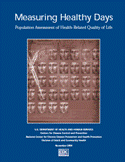Validity
Note: People with disabilities experiencing problems accessing the Validation of Behavioral Risk Factor Surveillance System document can contact CDC-INFO, or call 1-800-CDC-INFO (1-800-232-4636).
Andresen EM, Fitch CA, McLendon PM, Meyers AR. Reliability and validity of disability questions for US Census 2000. American Journal of Public Health. 2000;90(8):1297–1299.
Andreson EM, Fouts BS, Romeis JC, Brownson CA. Performance of health-related quality of life instruments in a spinal cord injured population. Arch Phys Med Rehab. 1999;(5):877–884.
Beatty P, Schechter S, Whitaker K. Evaluating subjective health questions: cognitive and methodological investigations. 1996 Proceedings of the American Statistical Association, Section on Survey Research Methods; May 16-19,1996; Salt Lake City, Utah.
Brzenchek J, Ahern K, Dominick D, Heller C, Gold C, Conway S. Self-reported health-related quality of life and health service utilization of Alzheimer’s patients. Gerontologist. 2001;41(S1):366–366.
Centers for Disease Control and Prevention (CDC). Health-related quality of life-Puerto Rico, 1996-2000. MMWR. 2002,51(08):166–8.
Clark MS, Bond MJ, Prior KN, Cotton AC. Measuring disability with parsimony: evidence for the utility of a single item. Disabil Rehabil. 2004;26(5):272–279.
Conway S, Gold, Dominick K, Ahern F, Heller D. Mental health-related quality of life (HRQOL) measures as predictors of cardiac hospitalization. Presentation at the 22nd Annual Meeting of the Society of Behavioral Medicine; March 21-24, 2001; Seattle, Washington.
Currey SS, Rao JK, Winfield JB, Callahan LF. Variations in health status among rheumatic disease patients using the BRFSS health-related quality of life measure. Arthritis and Rheum 2000. 43:(9 Suppl S):662.
Dominick KL, Ahern FM, Gold CH, Heller DA. Relationship of health-related quality of life to health care utilization and mortality among older adults. Aging Clin Exp Res. 2002;14(6):499-508.
Dominick K, Ahern F, Gold C, Heller D. Health-related quality of life (HRQOL) and psychotropic medication use among older adults with arthritis. Presentation at the 22nd Annual Meeting of the Society of Behavioral Medicine; March 21–24, 2001; Seattle, Washington.
Dominick K, Ahern F, Gold C, Heller D. Relationship of self-reported health conditions to health-related quality of life among the elderly (abstract). Gerontologist. 2000;40:93.
Dominick K, Gold C, Ahern F, Heller D. Cardiac drug use and health-related quality of life among older men and women. Gerontologist. 1999;39(1):244.
Dominick K, Ahern F, Gold C, Heller D, Brown T. Self-reported pain in the elderly and relationship to quality of life. Presentation at the 22nd Annual Meeting of the Society of Behavioral Medicine; November 15-18, 1998; Seattle, WA.
Gold C, Dominick K, Ahern F, Heller D. Medication use and health-related quality of life among the elderly (abstract). The Gerontologist. 2000;40:345.
Gold C, Dominick K, Ahern F, Heller D, Conway S. Health-related quality of life (HRQOL) and psychotropic medication use in older adults with diabetes. Presentation at the 22nd Annual Meeting of the Society of Behavioral Medicine; March 21-24, 2001; Seattle, Washington.
Hennessy CH, Moriarty DG, Zack MM, Scherr PA, Brackbill R. Measuring health-related quality of life for public health surveillance. Public Health Reports.1994;109:665–672.
Jia H, Muennig P, Lubetkin EI, Gold MR. Predicting geographic variations in behavioral risk factors; an analysis of physical and mental healthy days. J Epidemiol Community Health. 2004;58(2):150–155.
Mielenz T, Jackson E, Callahan LF, DeVellis R, Currey S. Psychometric properties of the Behavioral Risk Factor Surveillance System (BRFSS) Health Related Quality of Life (HRQOL) Items (B-HRQOL) in Arthritis. University of North Carolina, Chapel Hill, North Carolina.
Mielenz T, Jackson E, Currey S, DeVellis R, Callahan LF. Psychometric properties of the Centers for Disease Control and Prevention Health- Related Quality of Life (CDC HRQOL) items in adults with arthritis. Health Qual Life Outcomes. 2006;4:66.
Moriarty D, Zack M. Validation of the Centers for Disease Control and Prevention’s healthy days measures. Quality of Life Research.1999;8:617.
Nelson DE. Holtzman D. Bolen J. Stanwyck CA. Mack KA. Reliability and validity of measures from the Behavioral Risk Factor Surveillance System (BRFSS) Sozial- und Praventiv medizin. 2001;1:(46 Suppl) S3–42.
Newschaffer CJ. Validation of Behavioral Risk Factor Surveillance System (BRFSS) HRQOL Measures in a Statewide Sample. Atlanta: US Department of Health and Human Services, Public Health Service, Centers for Disease Control and Prevention, National Center for Chronic Disease Prevention and Health Promotion; 1998.
Ôunpuu S, Chambers LW, Patterson C, Chan D, Yusuf S Validity of the US Behavioral Risk Factor Surveillance System’s Health Related Quality of Life Survey Tool in a group of older Canadians. Chronic Diseases in Canada. 2001;22(3–4):93–101.
Ôunpuu S, Krueger P, Vermeulen M, Chambers L. Using the US Behavior Risk Factor Surveillance System’s Health Related Quality of Life Survey Tool in a Canadian city. Canadian Journal of Public Health. 2000;91(1)67–72.
Schechter S, Beatty P, Willis, GB. Asking survey respondents about health status: judgment and response issues. In: Cognition, Aging, and Self-Reports. Psychology Press, Philadelphia, PA; 1998. Chapter 13:265–83.
Currey S, Callahan L. The differential contribution of condition-specific measures to the Behavioral Risk Factor Surveillance System (BRFSS) health-related quality of life (HRQOL) items in rheumatic disease patients. Presentation at the 2001 Society of Behavioral Medicine meeting; March 21-24, 2001; Seattle, Washington.
Verbrugge L, Merrill S, Liu X. Measuring disability with parsimony. Disability and Rehabilitation. 1999;21(5–6):295–306.
Zullig K, Valois R, Huebner E, Drane J. Evaluating the performance of the Centers for Disease Control and Prevention core Health-Related Quality of Life scale with adolescents. Public Health Re.p 119(6):577–584.
Note: People with disabilities experiencing problems accessing the Validation of Behavioral Risk Factor Surveillance System document can contact CDCINFO@cdc.gov, or call 1-800-CDC-INFO (1-800-232-4636).
